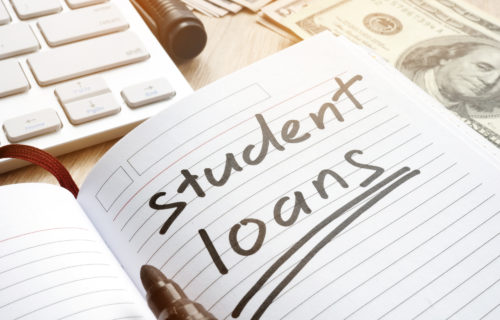Higher education seems to get even more expensive every year. While striving for the best grades and careers, students and parents may also struggle with getting student loan financing to cover these increasing college costs. Private and federal loans can be excellent options to help students pursue their academic ambitions.
If you are ineligible for federal loans or need to borrow more money to afford your tuition and college expenses, you may need to take out a private student loan. However, finding the best bank for private student loans can be difficult. Unlike federal student loans, private student loans offer additional features like fee waivers, loan insurance, and co-signer benefits. This guide covers a variety of private student loan services to help you identify the best student loan financing lender for funding your education.
Our picks for the best private student loans
Before getting any student loan, it’s essential to understand your options, the pros and cons of each, and how your student loan decision impacts your future. The following are our top picks for the best private student loans to help you decide which you should apply for.
Best overall: SoFi
Best for cosigners: Sallie Mae
Best for forbearance flexibility: LendKey
Best for member benefits: Ascent
Best for no fees: Earnest
12 Recommended Private Student Loan Financing Lenders
1. SoFi
SoFi is an excellent private student loan lender because they have some of the lowest interest rates on the market.
Benefits
SoFi offers a 0.25% interest rate reduction for setting up automatic payments and an additional 1% interest rate reduction if you make 12 on-time monthly payments.
Drawbacks
There is no co-signer release option for SoFi private student loans, and you must have a good credit score to qualify for the best interest rates.
2. Citizens Bank
A well-known private student loan lender, Citizens Bank, is a traditional bank with roots dating back to 1828 in Rhode Island. Ideal candidates include students that are enrolled at least half-time in a degree program at an eligible institution.
Benefits
Citizens Bank boasts that its loan program is easy, affordable, and flexible. They provide a plan to fund your student experience so you don’t have to reapply every year, have lower competitive rates with no application fees, and allow the borrower to choose how and when they want to pay.
Drawbacks
Citizens Bank has strict eligibility requirements and borrowing limits and does not currently disclose the minimum credit score requirements.
3. Ascent
Ascent is one of the private student loan lenders for undergraduate and graduate students who might not qualify for other types of financial aid.
Benefits
You can be approved for a loan without a co-signer or a good credit history. Ascent provides forbearance (pausing your loan payments) for up to 24 months during your repayment period if you experience financial hardship.
Drawbacks
Only college juniors, seniors, and graduate students are eligible for non-co-signed loans. Compared to some other private lenders, Ascent charges higher interest on your student loan payments.
4. Earnest
Earnest added private student loans in 2019 to its lineup to provide financial aid to undergraduate and graduate students.
Benefits
Earnest private student loans offer affordable interest rates and a more extended grace period than the industry standard.
Drawbacks
Earnest’s student loan financing requires a minimum 650 credit score for approval. There’s no co-signer option for student loan refinancing and no opportunity to release the co-signer on private student loans.
5. College Ave
College Ave Student Loans, a Delaware-based online lender founded in 2014, specializes in serving student loan borrowers.
Benefits
Private student loans are available from $1,000 up to the full cost of attendance. Student loan borrowers may also use the company to refinance existing student debt.
Drawbacks
Only students who are enrolled at least half-time can apply for private loans, and applicants must have a credit score of at least 650.
6. Sallie Mae
Sallie Mae is a private student loan provider that offers new and refinanced undergraduate loans. This lender offers variable rates and fixed rates for student loans.
Benefits
Sallie Mae offers flexible repayment options, including interest-only payments while in school and deferred payments. There are also no origination or prepayment fees.
Drawbacks
There is no co-signer release option for private student loans. Variable rate loans can end up with very high interest payments.
7. PNC
PNC is a traditional bank with locations throughout the United States that provides private loans to graduate and undergraduate students.
Benefits
PNC’s private student loan has no origination fees and a flexible repayment plan. You can choose to make interest-only payments while you’re in school or full principal and interest payments to get a head start on your student loan repayment.
Drawbacks
A good credit score is needed to qualify for PNC bank’s best interest rates. There are no deferment options or flexible monthly payments for borrowers in distress.
8. iHELP
iHELP provides private student loans from community banks in 4 to 11 states, depending on what type of loan you want. ZuntaFi is the loan servicer for these loans, and the community banks are the lenders.
Benefits
iHELP offers a more lenient repayment plan than other private student loan lenders. You can also find out if you’ll be approved without a hard credit check.
Drawbacks
There are no fixed-rate options for undergraduate or graduate loans. The starting variable interest rate is high, and the maximum APR will increase if you have a low credit score. Additionally, iHELP loans are only available in select states, and not available for part-time students.
9. Funding U
The best candidates for Funding U student loans are high-achieving undergraduates without a co-signer and with small funding gaps.
Benefits
No origination, application, or prepayment fees. You can choose between fixed and variable interest rates, and there are no penalties for delayed repayment. No cosigner is required.
Drawbacks
To qualify, you must have strong grades, a responsible financial history, and demonstrate the need for a student loan.
10. Education Loan Finance
A student loan program called Education Loan Finance, or ELFI, has been available since 2015. It offers new loans and refinancing solutions for federal and private student loans.
Benefits
Refinancing is available for all types of student loans, including parent loans. You can use this lender to put your Parent PLUS loans in your own name.
Drawbacks
The minimum amount of loans you must refinance is higher than other lenders, and there is no option for co-signer release.
11. Stride
Stride Funding was established in 2018 to give students an alternative to student loans. The business offers income-share contracts with generous repayment terms. You only have to start making your monthly payments when you are actually earning money from your degree.
Benefits
Stride bases its income sharing percentages on predicted future earnings and the loan term rather than taking credit score into account.
Drawbacks
Stride does not publicly state its maximum income share rate percentage. Additionally, the grace period for Stride is just three months, which is shorter than most other lenders.
12. Lend Key
LendKey is an online marketplace that links borrowers to new and refinanced private student loans from credit unions and neighborhood banks.
Benefits
LendKey offers 15 and 20-year loan repayment terms, with a forbearance period of 18 months, which is longer than many lenders.
Drawbacks
LendKey is only available in some US states. Borrowers are not eligible for a payment suspension if they re-enroll in school or join the military.
Frequently asked questions
Can I apply for a private student loan online?
Yes, you can apply for a private student loan online. The process is usually straightforward, and you can often get a decision within minutes.
What are the qualifications for a private student loan?
You will usually need a good credit score and proof of enrollment in an eligible school to qualify for a private student loan. Some lenders may also require that you have a co-signer.
Can I get a private student loan with bad credit?
It is possible to get a private student loan with bad credit, but you may have to pay a higher interest rate. Most lenders will require a co-signer if your credit score is below 650-700.
How do private student loans and federal student loans differ?
Private student loans tend to have higher interest rates and fees than federal student loans, which are provided by the federal government. Some federal student loan options may be eligible for loan forgiveness, which is something a private loan would not offer.
The Bottom Line
There are many different types of student loans available, and it is important to choose the right one for your individual needs. Private student loans can be a good option for those who don’t qualify for federal student aid or need additional funding. Compare interest rates, repayment terms, and fees before you apply to make sure you get the best deal.






